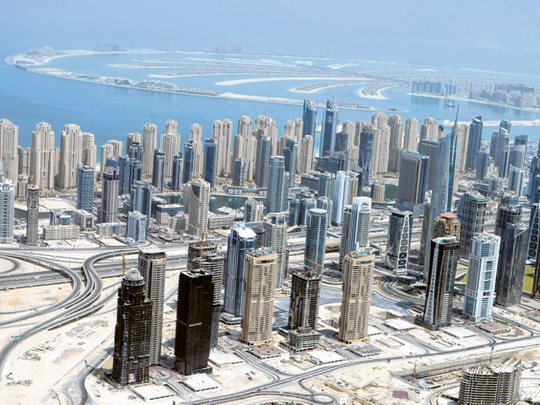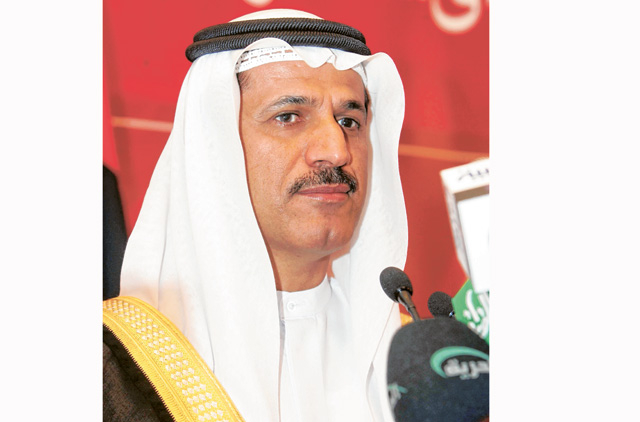
Dubai: As the UAE emerges from the global financial crisis, the country is planning a new strategy to ensure its economic growth.
This will not only include the expansion of its industrial base, but the opening of new markets in Africa and Asia.
The man in charge of developing and implementing this innovative economic strategy is Sultan Bin Saeed Al Mansouri, the UAE Minister of Economy. It is he who has steered the UAE through the global economic crisis.
Al Mansouri, a Western-educated businessman, was appointed Minister of Economy in February 2008, just before the economic downturn hit. That gave him little time to prepare for the financial crisis that engulfed the world.
But there was no one better qualified for dealing with the task.
He holds a bachelor's degree in Industrial Engineering and Management Systems from Arizona State University, as well as a Diploma in Computer Systems Analysis from the Institute of Computer Technology, Los Angeles, California.
Prior to taking over the economic portfolio, he was Minister for Government Services Development.
In an exclusive interview with Gulf News, Al Mansouri updates us with the latest on the UAE economy and fills us in about what we can expect in the future.
Excepts:
Gulf News: This interview has taken months to come about. Why was it difficult for the situation to be discussed previously?
Sultan Bin Saeed Al Mansouri: The government and the ministry were focusing on consolidating a plan to [deal with] the economic downturn in 2008.
The difficulties we faced were challenging. The federal and local governments worked together on different levels to overcome the problems and all the players in the UAE economy coordinated their efforts to provide solutions to the issues that resulted from the crisis.
The main focus for all of them was on how to achieve the goals set by the vision 2020, while dealing with the urgent issue of helping businesses to continue or [in some cases] to start again.
However, the act of putting things back on track was healthy. It proved that we have an excellent economic system, which works very well, especially in times of crisis.
The most important task was to assess the size of the problem and come up with the right solutions.
I'm sure that now we're on the right track and moving in the right direction to achieve our goals.
Can you give some examples of how things have changed since the crisis hit in 2008-09?
The economy was struggling in 2009 on a number of different fronts.
This year we're in a much better position though. Let me start with the latest economic figures.
The aviation sector, for instance, has experienced an overall growth of 12.5 per cent this year and the number of travellers using it is continuing to grow at a similar rate.
Trading, which declined sharply in 2009, increased markedly in the first nine months of the current year, with a total of 80 per cent growth in Dubai, this includes a 22 per cent increase in foreign trade; a 45 per cent increase in exports and a 26 per cent increase in re-exports.
In its recent report, the International Monetary Fund (IMF) stated that 20 per cent of the trading activity in the Middle East and the North African (Mena) region is being conducted through the UAE. This is testimony to the growing role the UAE is playing in regional and international trade.
The UAE is now among the top 20 nations in the world in terms of trade, which is a truly great achievement, considering the size of the country and its population.
How will the government ensure that trading continues to increase?
It's obvious that the UAE needs to look beyond its traditional trading arena and we're currently considering expanding our markets in Africa and elsewhere in the world, with the aim of becoming an international trading force.
In addition to expanding our trade with China, India, the EU, other Arab countries, as well as the GCC, we're looking for business partners in Africa and Latin America.
Africa offers great business opportunities and we're aware of the fact. The proximity of the African markets to the UAE, and the fact that they are only starting to pursue their development plans, increases the prospect of businesses in the Emirates playing greater roles and developing new markets there.
We're focusing now on three major sub-markets in the continent, including East Africa, South Africa and the West African nations.
These three regions import almost all of their necessities from abroad. As a result the UAE could become an important trading hub for them. We need to develop particular fields of industry in order to cater for the needs of these markets.
On the other hand, we have to enhance our trade links with markets in Central Asia.
The ministry of economy has established a strong presence in countries like Azerbaijan, Kazakhstan, Turkmenistan, Kyrgyzstan and Uzbekistan. I call upon businesses in the UAE to explore these countries as potential business markets and strengthen their presence in them.
I admit that the UAE has not paid much attention to these markets in the past, but at the Ministry of Economy we are focusing now on paving the way for UAE businesses by developing good relations with the governments of these states. I'm sure the UAE business community can work on improving the trade links which already exist.
Do you feel that trade is the key to future economic prosperity in the UAE?
Trade, in addition to other sectors working together, will ensure prosperity in the UAE. Oil's contribution to gross domestic product has fallen to 29 per cent for the first time, according to 2009 statistics, but oil is still one of the most important factors in the UAE economy.
Diversifying our economic resources and activities is the key and this is one of the most important lessons we've learnt from the crisis. In 2009, the non-oil sector's contribution to GDP, for the first time in the history of the UAE, hit 71 per cent. It was 66.5 per cent in 2008.
As you can see from previous figures, diversification policies have helped us to overcome the global financial crisis.
So what does the UAE plan to focus on in the future?
Industry. Facilitating the growth of a sound industrial sector is key for future developments in the UAE.
But how can industry be expanded when nearly everything required for it has to be imported, including manpower ? And how do we compete with nations that offer cheap labour?
The government is considering industries, which would give the UAE a distinct advantage. We've defined three major sectors which should increase our industrial growth. These are aluminium, steel and the petrochemical's industries, all of which would allow the UAE to compete on an international scale.
Our infrastructure, our logistical capabilities and the services we can offer, in addition to the knowledge we've gained about how to achieve in regional and international markets, are all in our favour when it comes to achieving sound industrial development.
The UAE has the ability to develop a fantastic industrial sector and the government is working to achieve this objective, in line with the vision 2020 plan.
We know for certain that we don't have the population density for labour intensive industries, but we also know that we have natural power that should not be exported from here in its crude format and the industrial sector should concentrate on this.
In the past year, the manufacturing sector represented 16.2 per cent of GDP and I expect it to increase dramatically in the coming years. We're looking at 30 to 35 per cent of an industrial contribution to the GDP in the next five years.
What do you think lies ahead for the construction and real estate sectors in the UAE in general and in particular in Dubai? Do you think they will recover soon from the negative impact of the 2008 global financial crisis?
Let me put the situation into perspective. Construction represents just 10.7 per cent of GDP in the UAE, according to figures from the past year and partly, what happened in both the construction and real estate sectors was expected and quite healthy.
We know that some companies have experienced tough times during the crisis, but I don't see the downturn continuing in this sector, now or in the future. There are strong signs that these sectors are picking up again.
I'm sure that we've hit the bottom in the real estate sector and we're now in the recovery stage.
I'm also sure that the forecasted development in trade, tourism, logistics, service and financial sectors will consume the additional number of apartments available in the market.
Dubai and the UAE will remain among the few places in the world to attract people because of its good living conditions. The prices have become more reasonable now and many people would love to come to live in the UAE. Only a few cities in the world offer a good quality of life as Dubai.
One investor in a popular real estate project in Dubai suggested that foreign investors have committed a great mistake by investing in a country that has limited laws and where investors' rights are not defined clearly.
She said they've invested their money without knowing what they're going to get in return because of the reliable image put across by the country, which suggests that things will not go wrong.
Some companies, for example, committed to projects before realising that the community service fees were so high and that promises of residency were connected to the ownership of properties. What do you think about such a complaint?
This investor complaint is partly correct and no doubt genuine, but, in my opinion, no businessman or woman should regret investing in the UAE. We have a dynamic local and federal government that spares no effort in addressing all problems, including ones we've faced with the outstanding growth of the real estate sector.
For example, look at the Real Estate Regulatory Authority (Rera) in Dubai, this authority, which is part of the Dubai Land Department, did not exist before July 2007.
The authority was established to address issues faced by the real estate sector and it managed to create a strong presence in a reasonably short period of time. I'm sure there are still some issues that need to be addressed, like the one raised by this investor.
However, I think Rera is the right place to air these concerns and [people with complaints should] work with them to find solutions to any problem they come across.
In the UAE, we have earned a reputation for having a professional approach to solving issues. We don't have the kind of political system that forces us to say something we don't believe in, or to do things that are against our common sense.
The government and every official in the UAE strives to keep such an image intact. We're working hard to make the UAE the first choice for investments from all over the world.
- 12.5% overall growth in aviation sector last year
- 80% growth in UAE trade in first nine months this year
- 22% rate of increase in foreign trade
- 45% rate of increase in UAE exports
- 26% rate of increase in UAE re-exports













